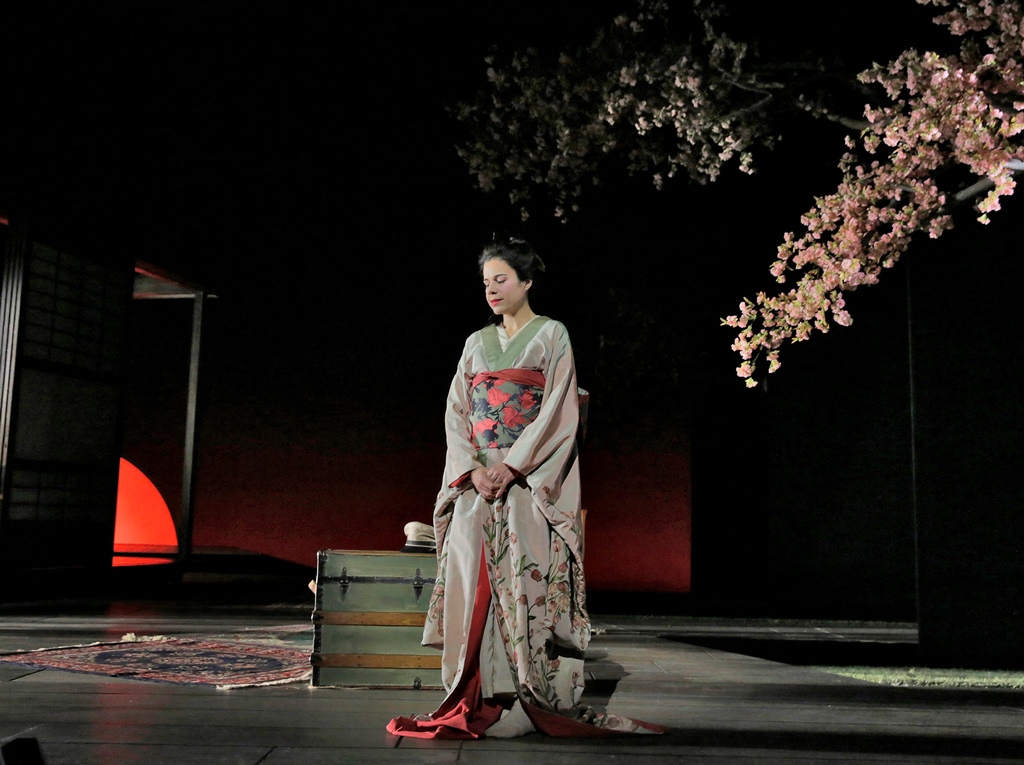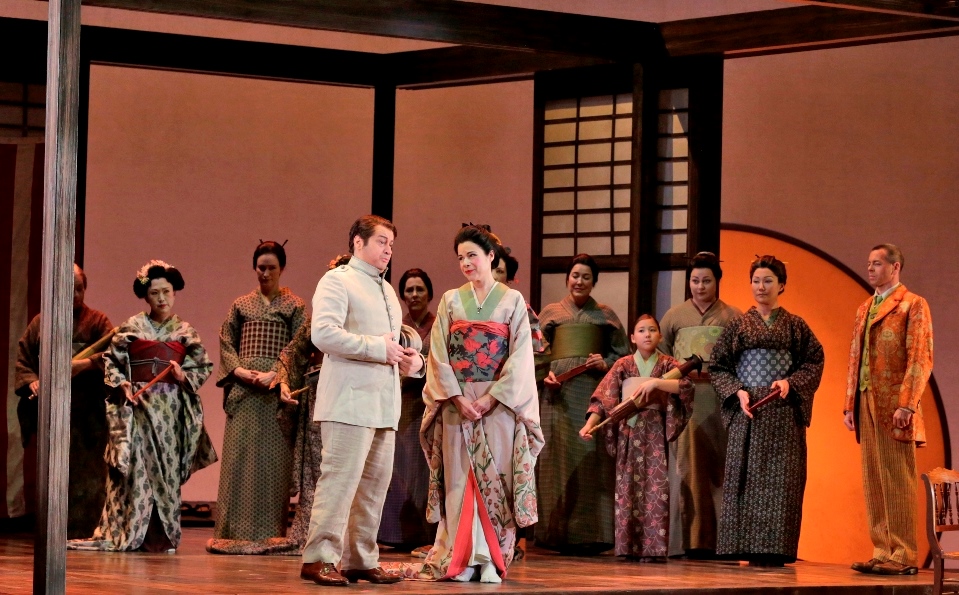L.A. Opera's 'Butterfly' soars to lyrical heights
/By Truman C. Wang
Tuesday, March 29, 2016
All photos by Ken Howard / Los Angeles Opera
"Madama Butterfly", Act I Cio-Cio-San's entrance
CAST: Ana Maria Martinez (Cio-Cio-San), Stefano Secco (B.F. Pinkerton), Milena Kitic (Suzuki), Kihun Yoon (Sharpless), Keith Jameson (Goro), Daniel Armstrong (Yamadori), Nicholas Brownlee (The Bonze), Lacey Jo Benter (Kate Pinkerton), Michael Alspaugh (Cio-Cio-San's child 'Trouble')
CREATIVE TEAM: James Conlon (Conductor), Lee Blakeley (Director), Jean-Marc Puissant (Scenery Designer), Brigitte Reiffenstuel (Costume Designer), Rick Fisher (Lighting Designer), Grant Gershon (Chorus Director), Nicola Bowie (Movement Director)
Performance of Saturday, March 26, 2016 at Dorothy Chandler Pavilion, Los Angeles
Giacomo Puccini’s “Madama Butterfly” is such a familiar repertory warhorse that the music pretty much plays itself upon the push of a button, so to speak. However, when it’s well presented with a strong cast and a thoughtful production, such as the new staging at the L.A. Opera, one begins to look past the often facile tunes and see what a master of the theater Puccini was. Putting aside all the in-fighting between the composer and his librettists (mediated by their publisher Ricordi) and the resulting four version of the opera (Milan, Brescia, London and Paris), the version of the opera as currently performed today is largely focused on the personal tragedy of Cio-Cio-San herself. The deeply human and touching depiction of a fifteen-year-old geisha girl-turned-tragedienne, from the pure, virginal innocence of her entrance music (capped by an ethereal high D-flat), to the shattering poignancy of her eventual suicide, and every melodic turn and dramatic pause in between – Cio-Cio-San is the most superb of all Puccini’s creations in its apposite psychological characterization through music and poetry.
Last Saturday night’s Cio-Cio-San was Ana Maria Martinez, who received careful coaching in the art of traditional Japanese deportment from ‘Movement Director’ Nicola Bowie and looked every bit as authentic as if a Japanese actress was playing the part. To the ear, Ms. Martinez is a mesmerizing actress in the art of Italian bel canto singing, combining a loveliness of tone with rich subtleties of expression. One would not soon forget her beguiling, silky pianissimos in the Act I entrance, or Act II Cherry Blossom Duet, or the poignant phrase ‘I want him to see me dressed as I was on the first day’ (Vo’ che mi veda indosso il vel del primo di) sung in one long slow unbroken breath (fil di voce). Most memorable was Cio-Cio-San’s Act II scene throwing tantrums at marriage broker Goro while trying to hold a civilized conversation with American consul Sharpless. It was an unexpectedly lighthearted moment splendidly realized by Ms. Martinez, worthy of the great silent film actress-tragedienne Lillian Gish. Later in Act II, we saw this Butterfly soaring into the stratosphere of passion and unbearable heartache, as it slowly dawned on Cio-Cio-San that her husband might never return, that she might have to ‘go back to the geisha life…or better to die’. (tornar a diverter… oppur meglio morire). Through her superb acting and singing, Ms. Martinez made Puccini’s poor little girl seem almost heroic.
Ana Maria Martinez as Cio-Cio-San, Milena Kitic as Suzuki
The role of F.B. Pinkerton was the source of major brawls and headache for the opera’s creators. I think the best way to approach this ungrateful character today is to view him as a male-chauvinist buffoon and an unfortunate vestige of the fin-de-siècle Western colonial era. Italian tenor Stefano Secco put his best foot forward and delivered a clear-voiced Pinkerton, showing genuine remorse in his Act II romanza ‘Addio fiorito asil’. Mezzo-soprano Milena Kitic was a sensitive, gentle Suzuki. Baritone Kihun Yoon was the only voice of reason as the good American consul Sharpless. Rounding out the fine cast were tenor Keith Jameson’s comical, wily Goro, Bass-Baritone Nicholas Brownlee’s imposing Bonze and baritone Daniel Armstrong’s noble Prince Yamadori.
Kihun Yoon as Sharpless, Ana Maria Martinez as Cio-Cio-San
I have rarely heard the Los Angeles Opera Orchestra play so well under maestro James Conlon as on this night. The finely-chiseled Cherry Blossom Duet and the longingly sensuous Love Duet featured gorgeous, radiant high strings that seemed to permeate in the air like an intoxicating whiff of cherry blossom fragrance. Puccini’s famous pauses were handled with the same drama as the music – in Cio-Cio-San’s halting, suspenseful response to Sharpless’ question ‘What if he never returns?’ and in the series of ominous timpani crescendos prior to the revelation of the child. Throughout the opera, the intimate chamber music quality of playing alternated seamlessly and dramatically with grand symphonic sweeps to create a musically satisfying performance.
The Los Angeles Opera Chorus made an memorable Act I entrance, mirroring Cio-Cio-San’s delicate lines with charm and fluidity. In the famous Act II ‘Humming Chorus’, their fine singing echoed the luminous rays of moonlight with an undercurrent of pathos.
"Madama Butterfly", Act I
The strikingly beautiful Japanese sets and costumes are all too rare these days for a familiar work such as “Madama Butterfly”, where controversial avant-garde is the rule (recalling L.A. Opera’s last minimalist, little-loved production by Robert Wilson). I reserve special praise for Rick Fisher’s magical lighting effects, particularly in the all-night vigil scene, that flooded the sets with orange crepuscular glow of twilight, then a starry night sky, finally a beautiful powdery blue sunrise. Director Lee Blakeley stayed true to Puccini’s vision of the opera, having Cio-Cio-San’s child (valiantly played by Michael Alspaugh) grab the American flag and the sword from his mother’s lifeless body – the two things that killed her – and reject Pinkerton who was coming to take him away. This is, as Puccini had wished, Cio-Cio-San’s personal tragedy, not Pinkerton’s.
Two more performances remain on Thursday and Sunday. Catch this “Butterfly” while you still can.
Truman C. Wang is Editor-in-Chief of Classical Voice, whose articles have appeared in the San Gabriel Valley Tribune, the Pasadena Star-News, other Southern California publications, as well as the Hawaiian Chinese Daily.








